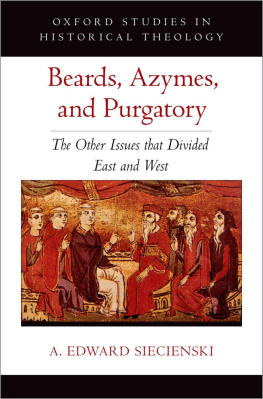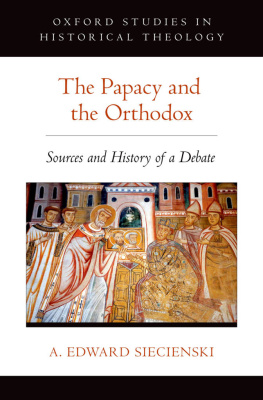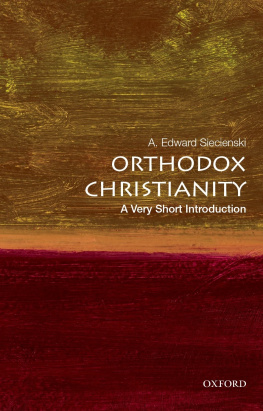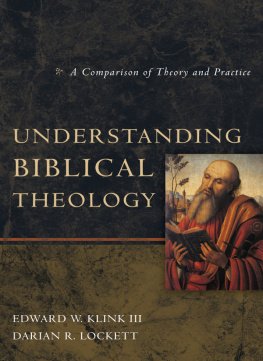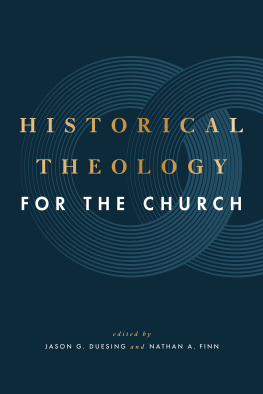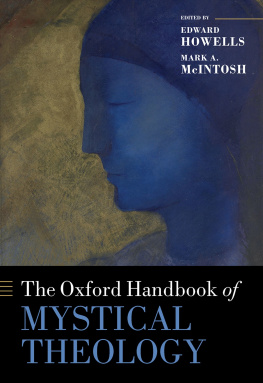A. Edward Siecienski - Beards, Azymes, and Purgatory (OXFORD STU IN HISTORICAL THEOLOGY SERIES)
Here you can read online A. Edward Siecienski - Beards, Azymes, and Purgatory (OXFORD STU IN HISTORICAL THEOLOGY SERIES) full text of the book (entire story) in english for free. Download pdf and epub, get meaning, cover and reviews about this ebook. year: 2022, publisher: Oxford University Press, genre: Religion. Description of the work, (preface) as well as reviews are available. Best literature library LitArk.com created for fans of good reading and offers a wide selection of genres:
Romance novel
Science fiction
Adventure
Detective
Science
History
Home and family
Prose
Art
Politics
Computer
Non-fiction
Religion
Business
Children
Humor
Choose a favorite category and find really read worthwhile books. Enjoy immersion in the world of imagination, feel the emotions of the characters or learn something new for yourself, make an fascinating discovery.
- Book:Beards, Azymes, and Purgatory (OXFORD STU IN HISTORICAL THEOLOGY SERIES)
- Author:
- Publisher:Oxford University Press
- Genre:
- Year:2022
- Rating:5 / 5
- Favourites:Add to favourites
- Your mark:
- 100
- 1
- 2
- 3
- 4
- 5
Beards, Azymes, and Purgatory (OXFORD STU IN HISTORICAL THEOLOGY SERIES): summary, description and annotation
We offer to read an annotation, description, summary or preface (depends on what the author of the book "Beards, Azymes, and Purgatory (OXFORD STU IN HISTORICAL THEOLOGY SERIES)" wrote himself). If you haven't found the necessary information about the book — write in the comments, we will try to find it.
Beards, Azymes, and Purgatory (OXFORD STU IN HISTORICAL THEOLOGY SERIES) — read online for free the complete book (whole text) full work
Below is the text of the book, divided by pages. System saving the place of the last page read, allows you to conveniently read the book "Beards, Azymes, and Purgatory (OXFORD STU IN HISTORICAL THEOLOGY SERIES)" online for free, without having to search again every time where you left off. Put a bookmark, and you can go to the page where you finished reading at any time.
Font size:
Interval:
Bookmark:
Series Editor
Richard A. Muller, Calvin Theological Seminary
Founding Editor
David C. Steinmetz
Editorial Board
Robert C. Gregg, Stanford University
George M. Marsden, University of Notre Dame
Wayne A. Meeks, Yale University
Gerhard Sauter, Rheinische Friedrich-Wilhelms-Universitt Bonn
Susan E. Schreiner, University of Chicago
John Van Engen, University of Notre Dame
Robert L. Wilken, University of Virginia
THE SYNOD OF PISTORIA AND VATICAN II
Jansenism and the Struggle for Catholic Reform
Shaun Blanchard
CATHOLICITY AND THE COVENANT OF WORKS
James Ussher and the Reformed Tradition
Harrison Perkins
THE COVENANT OF WORKS
The Origins, Development, and Reception of the Doctrine
J. V. Fesko
RINGLEADERS OF REDEMPTION
How Medieval Dance Became Sacred
Kathryn Dickason
REFUSING TO KISS THE SLIPPER
Opposition to Calvinism in the Francophone Reformation
Michael W. Bruening
FONT OF PARDON AND NEW LIFE
John Calvin and the Efficacy of Baptism
Lyle D. Bierma
THE FLESH OF THE WORD
The extra Calvinisticum from Zwingli to Early Orthodoxy
K.J. Drake
JOHN DAVENANTS HYPOTHETICAL UNIVERSALISM
A Defense of Catholic and Reformed Orthodoxy
Michael J. Lynch
RHETORICAL ECONOMY IN AUGUSTINES THEOLOGY
Brian Gronewoller
GRACE AND CONFORMITY
The Reformed Conformist Tradition and the Early Stuart Church of England
Stephen Hampton
MAKING ITALY ANGLICAN
Why the Book of Common Prayer Was Translated into Italian
Stefano Villani
AUGUSTINE ON MEMORY
Kevin G. Grove
UNITY AND CATHOLICITY IN CHRIST
The Ecclesiology of Francisco Suarez, S.J.
Eric J. DeMeuse
RETAINING THE OLD EPISCOPAL DIVINITY
John Edwards of Cambridge and Reformed Orthodoxy in the Later Stuart Church
Jake Griesel
CALVINIST CONFORMITY IN POST-REFORMATION ENGLAND
The Theology and Career of Daniel Featley
Gregory A. Salazar
BEARDS, AZYMES, AND PURGATORY
The Other Issues That Divided East and West
A. Edward Siecienski
A. EDWARD SIECIENSKI


Oxford University Press is a department of the University of Oxford. It furthers the Universitys objective of excellence in research, scholarship, and education by publishing worldwide. Oxford is a registered trade mark of Oxford University Press in the UK and certain other countries.
Published in the United States of America by Oxford University Press
198 Madison Avenue, New York, NY 10016, United States of America.
Oxford University Press 2023
All rights reserved. No part of this publication may be reproduced, stored in a retrieval system, or transmitted, in any form or by any means, without the prior permission in writing of Oxford University Press, or as expressly permitted by law, by license, or under terms agreed with the appropriate reproduction rights organization. Inquiries concerning reproduction outside the scope of the above should be sent to the Rights Department, Oxford University Press, at the address above.
You must not circulate this work in any other form and you must impose this same condition on any acquirer.
Library of Congress Control Number: 2022018899
ISBN 9780190065065
eISBN 9780190065089
DOI: 10.1093/oso/9780190065065.001.0001
To all those throughout the centuries who worked to bridge the gap between Christian East and West
You see, by this time I had spent several years dealing with the Filioque debates and I thought it might be a fun distraction to speak about the other issues that once divided Christendomthe beardlessness of the Western clergy and the Latins use of unleavened bread (azymes) in the mass. These questions, once thought so central to the genesis and maintenance of the East-West schism, were now regarded by most scholars as nothing more than relics of a bygone agethat is, as tools used by medieval polemicists to vilify the religious other that, even then, had little or no theological significance. To the twenty-first-century mind it seemed ridiculous that a church-dividing schism should occur on account of beards or different types of Eucharistic bread, and I used that fact in order to elicit a few laughs. As time passed I realized I was probably wrong to do so.
The more I worked through the material, especially as I was researching my second book (The Papacy and the Orthodox: Sources and History of a Debate), the more I came to regret the lighthearted way I treated the other issues that came to divide Christian East and West. It is true that today the Filioque and the papacy are the two (and perhaps only) significant barriers to restored communion between the Catholic and Orthodox Churches. Yet in working through these questions and examining the literature, it was impossible to escape the conclusion that for centuries the Filioque and papacy were not the only issues at stake, and indeed, for many of the participants in the medieval debates they were not even issues at all. For example, while the Roman primacy was never mentioned during the events of 1054, included in Cardinal Humberts anathema against Patriarch Michael Keroularios was the charge that preserving their hair and beards [the Greeks] do not receive into communion those who, according to the custom of the Roman church, cut their hair and shave their beards. Today the schism persists because of the Filioque and the papacy, but it did not begin that way.
By the Council of Ferrara-Florence (143839) another issue had raised its head and become an obstacle toward reunionthe Western doctrine of Purgatory. First raised during a thirteenth-century debate between the metropolitan of Corfu, George Bardanes, and a Franciscan friar named Bartholomew, the Latin teaching was viewed with great suspicion by the Greeks, who thought it advocated the sort of universalism once taught by Origen. Purgatory, although introduced rather late as a reason for the schism, had by the fifteenth century taken its place among its chief causes.
Purgatory, beards, and azymesthese were the other issues that separated East and West that few spoke of anymore. Today there are (quite literally) hundreds of books on the Roman primacy, and over the last fifteen years more than a few on the Filioque, but one has to look very hard for recent books or articles on azymes, or clerical beards, or the East-West debates on Purgatory. Having played so central a role in the genesis of the schism, they had simply receded into the background, not even considered worthy topics for modern-day dialogues between the two churches.
However, if ecumenical dialogue truly aims to heal the millennium-old schism between the Catholic and Orthodox Churches, it will certainly be necessary to retrace the steps that separated them in the first place. Of course, when one asks what actually caused the Great Schism, there are a variety of possible answersdivergent theological methodologies and ecclesiological approaches, differences in language and culture, different political systems and ways of reading historyall of which are, to a certain degree, valid. Yet there is another level where one is forced to admit that the immediate cause of the schism was the simple fact that half the church used leavened bread and the other unleavened bread. One is forced to admit that beards (or their lack) among the clergy was seen as reason for breaking Eucharistic communion. One is forced to admit that divergent understandings of the souls fate after death helped poison the last attempt at repairing the breach at Ferrara-Florence. The other issues cannot, and should not, be laughed off.
Font size:
Interval:
Bookmark:
Similar books «Beards, Azymes, and Purgatory (OXFORD STU IN HISTORICAL THEOLOGY SERIES)»
Look at similar books to Beards, Azymes, and Purgatory (OXFORD STU IN HISTORICAL THEOLOGY SERIES). We have selected literature similar in name and meaning in the hope of providing readers with more options to find new, interesting, not yet read works.
Discussion, reviews of the book Beards, Azymes, and Purgatory (OXFORD STU IN HISTORICAL THEOLOGY SERIES) and just readers' own opinions. Leave your comments, write what you think about the work, its meaning or the main characters. Specify what exactly you liked and what you didn't like, and why you think so.

